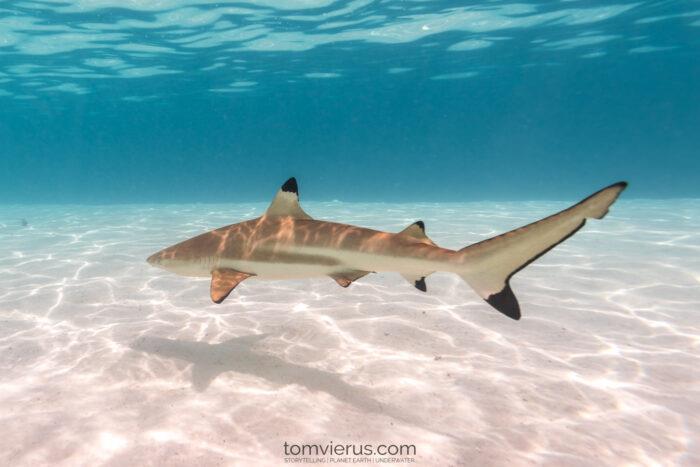
Life in the shallows becomes a trap for baby sharks
by Melissa Lyne 24 Jul 2020 16:26 UTC

Climate change is changing already extreme nursery environments for baby blacktip reef sharks © Tom Vierus,
www.tomvierus.com
Scientists can now explain how baby reef sharks tolerate living in the sometimes-extreme environments of their nurseries—but, they also say these habitats face an uncertain future which may leave newborn sharks 'trapped'.
The lead author of the study is Ian Bouyoucos, a PhD student at the ARC Centre of Excellence for Coral Reef Studies at James Cook University (Coral CoE at JCU).
"Nearshore, shallow water nurseries provide food and abundant shelter where baby blacktip reef sharks can avoid bigger predators, such as other sharks," Mr Bouyoucos said.
Though the word 'nursery' conjures images of soft, nurturing environments, these shallows are anything but. The habitats can be 'extreme', with dramatic changes in temperature and oxygen levels.
"It's not a nice place really, in terms of environmental conditions," said co-author Associate Professor Jodie Rummer, also from Coral CoE at JCU. The extremes of the shallows can mean high temperatures and low oxygen levels, which can be a strain at best.
"But we found the growth rate and metabolism of baby sharks is resilient to the temperature changes they currently face in these shallow habitats," Mr Bouyoucos said.
"We also found the sharks with a greater tolerance for higher temperatures had a greater tolerance for low oxygen levels, which is really promising."
Dr Rummer said mother blacktip reef sharks usually give birth close to shore. There may be, at most, only four pups born at a time with perhaps only one surviving.
"Essentially from the day they are born, these sharks have to be pretty tough in how their bodies work in order to tolerate these harsh environmental conditions," Dr Rummer said.
The research was conducted within the largest shark sanctuary in the world—the French Polynesian shark sanctuary. The top threat to sharks worldwide is overfishing, but sharks are protected within the 4.8 million square kilometre sanctuary.
Though the young sharks appear resistant to extreme changes the authors warn, as waters get warmer with climate change, future populations are threatened. While the sanctuaries might successfully remove the number one threat to these sharks, they don't protect against their second biggest threat: climate change.
"We know that healthy ocean ecosystems need healthy predators, and that healthy predators need healthy ecosystems—you can't have one without the other," Dr Rummer said.
She says newborn sharks have a narrow window of time in nursery habitats, where they have to grow, learn to hunt, and not get eaten.
"So, if these ecosystems disintegrate under climate change, the baby sharks fall into a 'trap'," Dr Rummer said.
"If they choose less harsh habitats, they lose their food and protection. If they remain within the safe, shallow nurseries, they suffer the effects of warming waters and decreasing oxygen levels. A trap, indeed."
Mr Bouyoucos says while these sharks can cope with these challenging conditions now, they are approaching their limits.
"There are already extreme fluctuations and extreme highs going on in the shallows—and the conditions are only getting worse," he said.
"We have to ask, will reef sharks continue to adapt and evolve over generations at a pace that's fast enough to keep up with climate change?"
Paper
Bouyoucos I, Morrison P, Weideli O, Jacquesson E, Planes S, Simpfendorfer C, Brauner C, Rummer J. (2020). 'Thermal tolerance and hypoxia tolerance are associated in blacktip reef shark (Carcharhinus melanopterus) neonates'. Journal of Experimental Biology. DOI: 10.1242/jeb.221937.